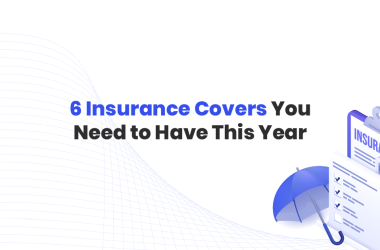Sometimes, a planned trip doesn’t always go as planned, and as a result of this, travel insurance is almost as vital as your passport because, without it, you could be at risk and suffer financially if anything goes wrong.
Many have had to pay for emergencies that occurred during a trip out of their pocket because they had no other option. This is why we included travel insurance in our list of must-have insurance policies.
Travel insurance is vital because health care overseas can be expensive, and most countries are not obligated to give you free or subsidised healthcare. That’s why no matter who you are and where you’re going, get travel insurance.
Major Types of Travel Insurance and What They Cover
Travel insurance sometimes can be complex, mainly because your health and finances are on the line. Details of what travel insurance covers might differ between insurers. You need to determine the most important things you want cover for and ensure your insurer covers that.
These are the major types of travel insurance covers that insurers provide:
Baggage and possessions: This cover protects baggage or personal belongings that get lost, stolen, or damaged during a trip. Even cash up to a certain amount can be insured. For baggage delays, there’s a certain level of insurance your insurer can provide but only when your luggage gets lost, damaged, or declared indefinitely delayed can they be responsible for the total cost of replacing your items.
Sometimes, airlines can reimburse you if anything happens to your luggage due to their error. The only problem with that is the reimbursement from airlines is minimal, and this is where your insurer comes in to provide you full baggage cover.
Trip cancellation/interruption: If you tend to book flights and hotel reservations earlier than your trip date, requiring you to make huge pre-payments or deposits, this is a cover you should get. Anything can happen in months or weeks, or even days and in cases where you have to cancel your trip, or you are unable to take your trip due to valid reasons, your insurer provides full cover for all the non-refundable payments you must have made.
If you have to cut your trip short, your insurer also provides cover for all non-refundable payments.
Legal costs: In a case where you need legal representation, or you have to pay legal fees for an incident that wasn’t entirely your fault, your insurer can step in to pick up the costs. If you also have to pay for liabilities due to something you did, your insurer can also step in to alleviate the costs.
Accident/ Flight accident coverage: This is similar to life insurance. If in a situation where an accident occurs during your trip that results in death, disability, or severe injury, this policy requires benefits to be paid to surviving beneficiaries. Another scenario where this comes in handy is if there’s a crash on a licensed commercial airliner resulting in the death of an insured traveler.
Medical coverage: This covers all medical expenses during your trip. With this coverage, you don’t have to worry about locating doctors or health care facilities. Depending on your policy, airlifting and evacuation for better care can be an option. There are two major medical coverages:
Short-term medical coverage: This policy protects a traveler within five days (5) to a year if any medical issues arise during a short trip.
Long-term medical coverage: This protects travelers that intend to take longer trips. It covers travelers from six months up to a year or longer.
All-inclusive travel insurance: This is the most expensive form of travel insurance. Think of it as encompassing. Your medical costs are covered, luggage is also covered, trip cancellation flight accidents are also covered. If everything that can go wrong goes wrong on your trip, you are covered.
If you are planning to take a trip, either to work or just relax, having travel insurance is worth it as it puts your mind at rest throughout your journey.
What is Not Included in Your Travel Insurance Cover?
In some extreme cases, your insurer cannot provide cover for you a couple of things. Examples of these cases include:
Pre-existing medical conditions: If you are not honest with your insurer and you end up falling sick as a result of a pre-existing condition, your insurer is not liable to protect you.
Taking trips to places that are dangerous for visitors: Some places do not qualify for insurance, most times due to unrest, war, kidnapping, etc. Insurers do not recognise injuries or mishaps that happen on such trips.
Involving in risky activities: If during a vacation, you are signed up for dangerous events such as scuba diving, motor racing, paragliding, diving, etc., injuries from these high-risk activities may not be covered by your insurer except you are provided unique cover.
Baggage delay: Insurers often do not reimburse claims fully if baggage is delayed for only a few hours or days. They only refund fully if your luggage has been declared indefinitely delayed.
Invalid cancellation reasons: If the reasons for cancelling a trip are weak, the insurer is right not to protect you. Reasons like the death of a pet, attending a social event, are considered invalid reasons for trip cancellation.
Death or sickness caused by the traveller: For example, death by drug overdose or suicide is not a part of the protection provided by an insurer.
Cost of Travel Insurance and Factors That Affect It
The cost of travel insurance depends on a lot of factors such as:
- How long is your trip is. The longer your trip, the more you are likely to pay for insurance.
- What level of cover would need? If you have special insurance requests, you are likely to pay more than if you don’t have any additional insurance requests.
- Your destination. Sometimes, factors like the cost of health care where you are travelling can affect the cost of your insurance. You are likely to pay less for countries with affordable health care than countries with expensive healthcare.
- Your age. Younger people (20s-mid 30s) are likely to pay lesser than older people. The older you get, the more you are likely to pay for insurance.
- The kind of activities you have planned. If you have many high-risk activities planned, you are likely to pay more for insurance as opposed to engaging in low-risk activities.
Other additional factors like having pre-existing health conditions, taking multiple trips across different countries, etc., also affect travel insurance costs.










